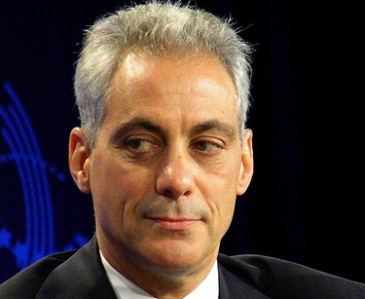ln Defense of Mayor Emanuel's Handling of the Pension Crisis [No, Seriously]
By Staff in News on Jun 22, 2014 6:30PM
For many years, there has been discussion about the looming pension crisis with which the city of Chicago would one day come face-to-face. Well, the day the city thought they could worry about in the future is now very rapidly approaching. The city’s required contribution to its pension funds will increase by more than twofold in 2015 to $1.07 billion.
This doesn’t take into account the Chicago Public School system, which has a looming $613 million payment due this year as well. The problem is that this is money that our city just doesn’t have to cough up in its current budget.
For those that are a bit in the dark about the city’s pension crisis, let’s do a bit of level-setting, courtesy of Melanie Hicken at CNN Money.
The city of Chicago is home to several pension funds, namely for city workers, firefighters, and police officers. In aggregate they currently face a deficit of nearly $20 billion.
The Chicago Teacher’s Pension Fund, which has its own budgeting policy, is currently underfunded by another $8 billion.
In total, Chicago’s pension funds contain only 36 percent of the cash needed to meet all future payouts, while the teacher’s fund has just over 50 percent.
Ms. Hicken goes on to explain how we got into this current mess, a result of a deadly cocktail of investment losses in the fund due to the two major market crashes of the century (dot com bubble burst and the 2008 crisis, respectively) while legislators passed payout increases to future retirees.
Now that the chickens are coming home to roost, it’s time for some tough choices. Choices which will likely cause pain both to the beneficiaries of the pension funds, as well as all taxpayers in the city of Chicago, and possibly the entire state of Illinois.
Unfortunately, there is no way around it, which is probably why our city’s officials have long been attempting to punt on a course of action until absolutely necessary. It’s difficult to stay a career politician when you’re pinching the pocketbooks of your voting base. [Just ask President George H.W. Bush.]
And that’s really the crux of the problem. Historically, voters tend to react to politicians making tough choices to fix problems by voting them out of office because they don’t like the consequences on their pocketbooks or on their households. The bottom line here is that our city’s workers have been promised retirement benefits, and the cash to fund them just doesn’t exist.
Our politicians are fearful of angering voters through tax increases or benefit reductions to city workers as their jobs would be on the line at the next election cycle.
Well, politicians except for Chicago Mayor Rahm Emanuel.
Earlier this month, Mayor Rahm Emanuel was touting a property tax hike in the city of Chicago to raise approximately $750 million over five years to help fund the shortfall, which is tantamount to political suicide.
The city’s alderman and the state legislators, all the way up to Illinois Governor Pat
Quinn, fought back vehemently—likely knowing that come next election cycle the tax increase could result in the search for a new job.
Ultimately, a compromise was formed that would cut benefits and raise the retirement age for some of the city’s pension funds.
Governor Quinn also signed into law an increase on 911 fees to generate an estimated $50 million next year to delay the notion of a property tax hike, which really is politically untenable for any career politician.
Well, Mayor Emanuel posed two solutions to the crisis in an interview with Crain’s Chicago Business. One of which comprised of negotiating a deal with labor unions, which we can only presume would be a deal that would likely result in a further reduction in promised payouts.
Another proposed solution would be through legislation that covers more than just Chicago, but the entire state of Illinois, which, again, we can only presume would result in increased taxes to fund the pension.
Say what you want about Mayor Emanuel, and we know that he’s a very polarizing figure. But he is working hard to try to resolve a financial mess that he inherited as mayor and is willing to make tough decisions that very well may cost him his job, all in the name of trying to keep the sinking ship of Chicago’s pension crisis afloat.
Those are the types of decisions we should applaud our politicians for making, instead of deriding them.
Ultimately, our votes at the ballot box are signals to our legislators about the types of action of which we approve and disapprove.
You may disagree with Mayor Emanuel’s policies and believe there others who propose better solutions. [Which we all know is absolutely a valid reason to vote against him in the next mayoral election on February 24, 2015.]
But to punish Mayor Emanuel with your ballot strictly for making tough choices to right our city would do nothing but signal to our legislators that they should continue to avoid and punt on problems that affect our communities, rather than to face them head on.
By: Amol Gavankar
